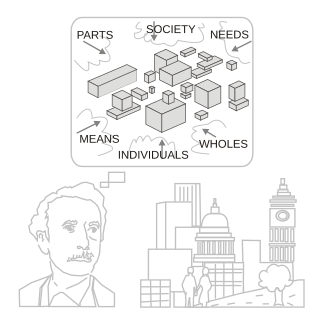Related Research Articles

Systems engineering is an interdisciplinary field of engineering and engineering management that focuses on how to design, integrate, and manage complex systems over their life cycles. At its core, systems engineering utilizes systems thinking principles to organize this body of knowledge. The individual outcome of such efforts, an engineered system, can be defined as a combination of components that work in synergy to collectively perform a useful function.
Nuclear engineering is the branch of engineering concerned with the application of breaking down atomic nuclei (fission) or of combining atomic nuclei (fusion), or with the application of other sub-atomic processes based on the principles of nuclear physics. In the sub-field of nuclear fission, it particularly includes the design, interaction, and maintenance of systems and components like reactors, power plants, or weaponry. The field also includes the study of medical and other applications of radiation, particularly Ionizing radiation, nuclear safety, heat/thermodynamics transport, nuclear fuel, or other related technology and the problems of nuclear proliferation. This field also includes chemical engineering and electrical engineering.

Barry William Boehm was an American software engineer, distinguished professor of computer science, industrial and systems engineering; the TRW Professor of Software Engineering; and founding director of the Center for Systems and Software Engineering at the University of Southern California. He was known for his many contributions to the area of software engineering.
Process engineering is the understanding and application of the fundamental principles and laws of nature that allow humans to transform raw material and energy into products that are useful to society, at an industrial level. By taking advantage of the driving forces of nature such as pressure, temperature and concentration gradients, as well as the law of conservation of mass, process engineers can develop methods to synthesize and purify large quantities of desired chemical products. Process engineering focuses on the design, operation, control, optimization and intensification of chemical, physical, and biological processes. Process engineering encompasses a vast range of industries, such as agriculture, automotive, biotechnical, chemical, food, material development, mining, nuclear, petrochemical, pharmaceutical, and software development. The application of systematic computer-based methods to process engineering is "process systems engineering".

Systems science, also referred to as systems research, or, simply, systems, is an interdisciplinary field concerned with understanding systems—from simple to complex—in nature, society, cognition, engineering, technology and science itself. The field is diverse, spanning the formal, natural, social, and applied sciences.

Erich Jantsch was an Austrian-born American astrophysicist, engineer, educator, author, consultant and futurist, especially known for his work in the social systems design movement in Europe in the 1970s.

Fire protection engineering is the application of science and engineering principles to protect people, property, and their environments from the harmful and destructive effects of fire and smoke. It encompasses engineering which focuses on fire detection, suppression and mitigation and fire safety engineering which focuses on human behavior and maintaining a tenable environment for evacuation from a fire. In the United States 'fire protection engineering' is often used to include 'fire safety engineering'.
The philosophy of engineering is an emerging discipline that considers what engineering is, what engineers do, and how their work affects society, and thus includes aspects of ethics and aesthetics, as well as the ontology, epistemology, etc. that might be studied in, for example, the philosophy of science or the philosophy of technology.
In business, engineering, and manufacturing, quality – or high quality – has a pragmatic interpretation as the non-inferiority or superiority of something ; it is also defined as being suitable for the intended purpose while satisfying customer expectations. Quality is a perceptual, conditional, and somewhat subjective attribute and may be understood differently by different people. Consumers may focus on the specification quality of a product/service, or how it compares to competitors in the marketplace. Producers might measure the conformance quality, or degree to which the product/service was produced correctly. Support personnel may measure quality in the degree that a product is reliable, maintainable, or sustainable. In such ways, the subjectivity of quality is rendered objective via operational definitions and measured with metrics such as proxy measures.
Derek K. Hitchins is a British systems engineer and was professor in engineering management, in command & control and in systems science at Cranfield University at Cranfield, Bedfordshire, England.
Byrana Nagappa Suresh is an Indian aerospace scientist. He is presently the Chancellor, Indian Institute of Space Science and Technology (IIST) at Thiruvananthapuram and Honorary Distinguished Professor at ISRO HQ. He was President Indian National Academy of Engineering, INAE at Delhi, for four years during 2015 to 2018. He served as the Director of Vikram Sarabhai Space Centre (VSSC), Thiruvananthapuram during the period 2003–2007. He is known for his contribution to the development of Indian launch vehicles, Space Capsule Recovery Experiments (SRE) and also for R& D management. Suresh also served as the founding director of Indian Institute of Space Science and Technology (IIST), Thiruvananthapuram. He retired from IIST in November 2010. He was Vikram Sarabhai Distinguished Professor at ISRO HQ for 5 years since November 2010 and also a professor at IIT, Mumbai and MIT, Manipal for 3 years. He was a member of the board of governors (BOG) for IIT, Madras for 7 years until July 2018. He is the vice chair for the Design Division of Aeronautical Society of India. He is one of the associate editors of the book From Fishing Hamlet To Red Planet and a co-author of Ever Upwards: ISRO in Images, both tracing the history of Indian Space Research Organisation. He is the President of the reputed Jnanadeepa Senior Secondary School and Sri Aurobindo Foundation for Education

Willis Harmon Ray is an American chemical engineer, control theorist, applied mathematician, and a Vilas Research emeritus professor at the University of Wisconsin–Madison notable for being the 2000 winner of the prestigious Richard E. Bellman Control Heritage Award and the 2019 winner of the Neal Amundson Award.

David Ing is a Canadian systems scientist, business architect, management consultant, and marketing scientist. He served as President of the International Society for the Systems Sciences (2011-2012).
Kevin John Forsberg is an American engineer, business consultant, and with Harold Mooz co-founder and executive director of The Center for Systems Management, who was awarded the INCOSE Pioneer Award in 2001.
Charles (Chuck) M. Eastman was a professor and a pioneer in the areas of design cognition, building information modeling (BIM), solid and parametric modeling, engineering databases, product models, and interoperability. He is best known for his work on building description system, which later gave him a title as the 'father of BIM.'
Vivek Vinayak Ranade is an Indian chemical engineer, entrepreneur and a professor of chemical engineering at the School of Chemistry and Chemical Engineering of the Queen's University, Belfast. He is a former chair professor and deputy director of the National Chemical Laboratory, Pune. He is known for his work on bubble column, stirred and trickle-bed reactors and is an elected fellow of the Indian Academy of Sciences, Indian National Science Academy. and the Indian National Academy of Engineering. The Council of Scientific and Industrial Research, the apex agency of the Government of India for scientific research, awarded him the Shanti Swarup Bhatnagar Prize for Science and Technology, one of the highest Indian science awards for his contributions to Engineering Sciences in 2004.
Vitech Corporation is a systems engineering company responsible for the development and management of two model-based systems engineering tools, GENESYS and CORE. Vitech products have a range of applications and have been used for program management by the U.S. Department of Energy, for railway modernization and waste management in Europe, and for space station and ground-based air defense system development in Australia. In an effort to promote the study of model-based systems engineering, Vitech partners with universities throughout the United States, providing them with its software for instructional and research purposes.
The Systems Engineering Body of Knowledge (SEBoK), formally known as Guide to the Systems Engineering Body of Knowledge, is a wiki-based collection of key knowledge sources and references for systems engineering. The SEBoK is a curated wiki meaning that the content is managed by an editorial board, and updated on a regular basis. This wiki is a collaboration of three organizations: 1) International Council on Systems Engineering (INCOSE), 2) IEEE Systems Council, and 3) Stevens Institute of Technology. The most recent version (v.2.5) was released on October 15, 2021.
References
- 1 2 World Future Society (1987) The Futures Research Directory: Individuals. p. 142
- 1 2 3 Janes, F. R., and R. Jowitt. "Applications of interactive management in planning for a university department." Systems Prospects. Springer US, 1989. 243-250.
- ↑ Skyrme, David J. "Valuing knowledge: is it worth it?." Managing information 5.2 (1998): 24-26.
- ↑ "M'PHERSON". The Telegraph. Retrieved 21 February 2018.
- 1 2 3 4 INCOSE. "INCOSE - Pioneers". Archived from the original on 17 April 2007. Retrieved 9 May 2007.
- 1 2 3 4 Philip M'Pherson technical/invited speakers/biography at incose.org. 2006
- 1 2 3 M'Pherson, P. K. (1974). A perspective on systems science and systems philosophy. Futures, 6, pp. 219–239
- ↑ M’Pherson (1974, p. 229); as cited by: Hieronymi, A. (2013), Understanding Systems Science: A Visual and Integrative Approach. Syst. Res.. doi : 10.1002/sres.2215